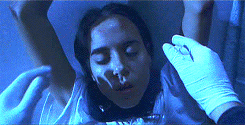82
The experience of transparent immediacy remains important in contemporary Hollywood film, but it is not the sole experience that even Hollywood film offers. Even for a male viewer, a recurring fascination with the medium distances and frames the viewing experience; the viewer oscillates between a desire for immediacy and a fascination with the medium. This distancing and framing occur not only for the spectator in the darkened theater, but also during all the other manifestations that precede and follow that supposedly isolated experience: the previews playing on monitors in the lobby of the theater; the home viewing of whole films on videocassette; the appearance of trailers, film stills, and information on the World Wide Web; and so on. These agents of remediation are at work for older films as well as contemporary ones. Perhaps it was still possible in 1958 to view Vertigo in relative isolation from other media. (In its early days, television remediated vaudeville and live theater more often than it remediated film) But now even old films are caught in the logic of hypermediacy. In the mid-1990s a remastered version of Vertigo was released for the theater, and part of the remastering process included digital enhancing. The movie is available on videocasette and on laser disk, and a search of of the Web reveals well over two-thousand web documents that mention Hitchcock's Vertigo, some of which include film stills.
The experience of transparent immediacy remains important in contemporary Hollywood film, but it is not the sole experience that even Hollywood film offers. Even for a male viewer, a recurring fascination with the medium distances and frames the viewing experience; the viewer oscillates between a desire for immediacy and a fascination with the medium. This distancing and framing occur not only for the spectator in the darkened theater, but also during all the other manifestations that precede and follow that supposedly isolated experience: the previews playing on monitors in the lobby of the theater; the home viewing of whole films on videocassette; the appearance of trailers, film stills, and information on the World Wide Web; and so on. These agents of remediation are at work for older films as well as contemporary ones. Perhaps it was still possible in 1958 to view Vertigo in relative isolation from other media. (In its early days, television remediated vaudeville and live theater more often than it remediated film) But now even old films are caught in the logic of hypermediacy. In the mid-1990s a remastered version of Vertigo was released for the theater, and part of the remastering process included digital enhancing. The movie is available on videocasette and on laser disk, and a search of of the Web reveals well over two-thousand web documents that mention Hitchcock's Vertigo, some of which include film stills.
As a result of such remediations, we may all experience film and other visual media with something of that multiple consciousness or "double desire" that Teresa de Lauretis (1984, 155) ascribes to the female spectator, who is necessarily shut out from any simple participation in the transparent male gaze (cf. Doane 1991, 17-32). The remediation of the male gaze is apparent in Strange Days, when Lenny experiences a wire recording of a brutal rape and murder simultaneously from the points of view of the male assailant and his female victim. The violent potential of the male gaze is not denied, but it is certainly complicated by the remediating power of the wire. The male gaze can be distanced and framed by new media as well-for example, in the Amsterdam webcam, which purports to monitor the windows of rooms occupied by prostitutes.
As a result of such remediations, we may all experience film and other visual media with something of that multiple consciousness or "double desire" that Teresa de Lauretis (1984, 155) ascribes to the female spectator, who is necessarily shut out from any simple participation in the transparent male gaze (cf. Doane 1991, 17-32). The remediation of the male gaze is apparent in Strange Days, when Lenny experiences a wire recording of a brutal rape and murder simultaneously from the points of view of the male assailant and his female victim. The violent potential of the male gaze is not denied, but it is certainly complicated by the remediating power of the wire. The male gaze can be distanced and framed by new media as well-for example, in the Amsterdam webcam, which purports to monitor the windows of rooms occupied by prostitutes.
 Source type: picture
Source type: pictureInfo: Strange Days - Lenny experiences a wire recording of a brutal rape and murder simultaneously
Original size: 245x125 px. Edit
 Log-in
Log-in